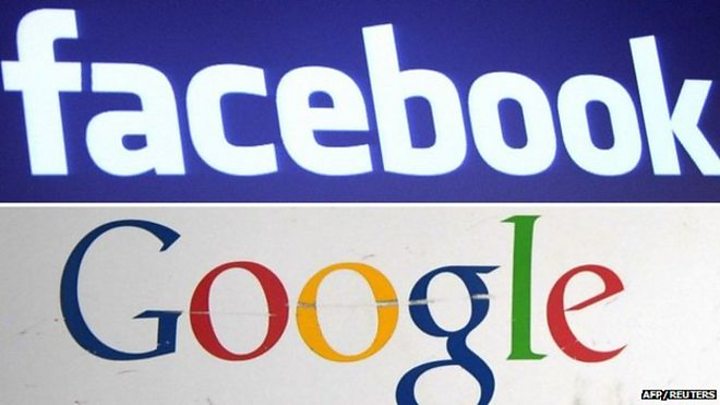
Audio By Carbonatix
British comedian Sacha Baron Cohen has said if Facebook had existed in the 1930s it would have allowed Hitler a platform for his anti-Semitic beliefs.
The Ali G star singled out the social media company in a speech in New York.
He also criticised Google, Twitter and YouTube for pushing "absurdities to billions of people".
Social media giants and internet companies are under growing pressure to curb the spread of misinformation around political campaigns.
Twitter announced in late October that it would ban all political advertising globally from 22 November.
Earlier this week Google said it would not allow political advertisers to target voters using "microtargeting" based on browsing data or other factors.
Analysts say Facebook has come under increasing pressure to follow suit.
Addressing the Anti-Defamation League's Never is Now summit, Baron Cohen took aim at Facebook boss Mark Zuckerberg who in October defended his company's position not to ban political adverts that contain falsehoods.
"If you pay them, Facebook will run any 'political' ad you want, even if it's a lie. And they'll even help you micro-target those lies to their users for maximum effect," he said.
"Under this twisted logic, if Facebook were around in the 1930s, it would have allowed Hitler to post 30-second ads on his 'solution' to the 'Jewish problem'."
Baron Cohen said it was time "for a fundamental rethink of social media and how it spreads hate, conspiracies and lies". He also questioned Mr Zuckerberg's characterisation of Facebook as a bastion of "free expression".
 Media captionVIDEO: How online advertising affects political campaigns
"I think we could all agree that we should not be giving bigots and paedophiles a free platform to amplify their views and target their victims," he added.
Facebook has not commented on the remarks.
Earlier this month, an international group of lawmakers called for targeted political adverts on social media to be suspended until they are properly regulated.
The International Committee on Disinformation and Fake News was told that the business model adopted by social networks made "manipulation profitable".
A BBC investigation into political ads for next month's UK election suggested they were being targeted towards key constituencies and certain age groups.
Media captionVIDEO: How online advertising affects political campaigns
"I think we could all agree that we should not be giving bigots and paedophiles a free platform to amplify their views and target their victims," he added.
Facebook has not commented on the remarks.
Earlier this month, an international group of lawmakers called for targeted political adverts on social media to be suspended until they are properly regulated.
The International Committee on Disinformation and Fake News was told that the business model adopted by social networks made "manipulation profitable".
A BBC investigation into political ads for next month's UK election suggested they were being targeted towards key constituencies and certain age groups.
 Media captionVIDEO: How online advertising affects political campaigns
"I think we could all agree that we should not be giving bigots and paedophiles a free platform to amplify their views and target their victims," he added.
Facebook has not commented on the remarks.
Earlier this month, an international group of lawmakers called for targeted political adverts on social media to be suspended until they are properly regulated.
The International Committee on Disinformation and Fake News was told that the business model adopted by social networks made "manipulation profitable".
A BBC investigation into political ads for next month's UK election suggested they were being targeted towards key constituencies and certain age groups.
Media captionVIDEO: How online advertising affects political campaigns
"I think we could all agree that we should not be giving bigots and paedophiles a free platform to amplify their views and target their victims," he added.
Facebook has not commented on the remarks.
Earlier this month, an international group of lawmakers called for targeted political adverts on social media to be suspended until they are properly regulated.
The International Committee on Disinformation and Fake News was told that the business model adopted by social networks made "manipulation profitable".
A BBC investigation into political ads for next month's UK election suggested they were being targeted towards key constituencies and certain age groups.DISCLAIMER: The Views, Comments, Opinions, Contributions and Statements made by Readers and Contributors on this platform do not necessarily represent the views or policy of Multimedia Group Limited.
DISCLAIMER: The Views, Comments, Opinions, Contributions and Statements made by Readers and Contributors on this platform do not necessarily represent the views or policy of Multimedia Group Limited.
Latest Stories
-
Ghana’s global image boosted by our world-acclaimed reset agenda – Mahama
9 minutes -
Full text: Mahama’s New Year message to the nation
9 minutes -
The foundation is laid; now we accelerate and expand in 2026 – Mahama
29 minutes -
There is no NPP, CPP nor NDC Ghana, only one Ghana – Mahama
31 minutes -
Eduwatch praises education financing gains but warns delays, teacher gaps could derail reforms
44 minutes -
Kusaal Wikimedians take local language online in 14-day digital campaign
2 hours -
Stop interfering in each other’s roles – Bole-Bamboi MP appeals to traditional rulers for peace
2 hours -
Playback: President Mahama addressed the nation in New Year message
2 hours -
Industrial and Commercial Workers’ Union call for strong work ethics, economic participation in 2026 new year message
4 hours -
Crossover Joy: Churches in Ghana welcome 2026 with fire and faith
4 hours -
Traffic chaos on Accra–Kumasi Highway leaves hundreds stranded as diversions gridlock
4 hours -
Luv FM Family Party in the Park: Hundreds of families flock to Luv FM family party as more join the queue in excitement
4 hours -
Failure to resolve galamsey menace could send gov’t to opposition – Dr Asah-Asante warns
5 hours -
Leadership Lunch & Learn December edition empowers women leaders with practical insights
5 hours -
12 of the best TV shows to watch this January
5 hours
